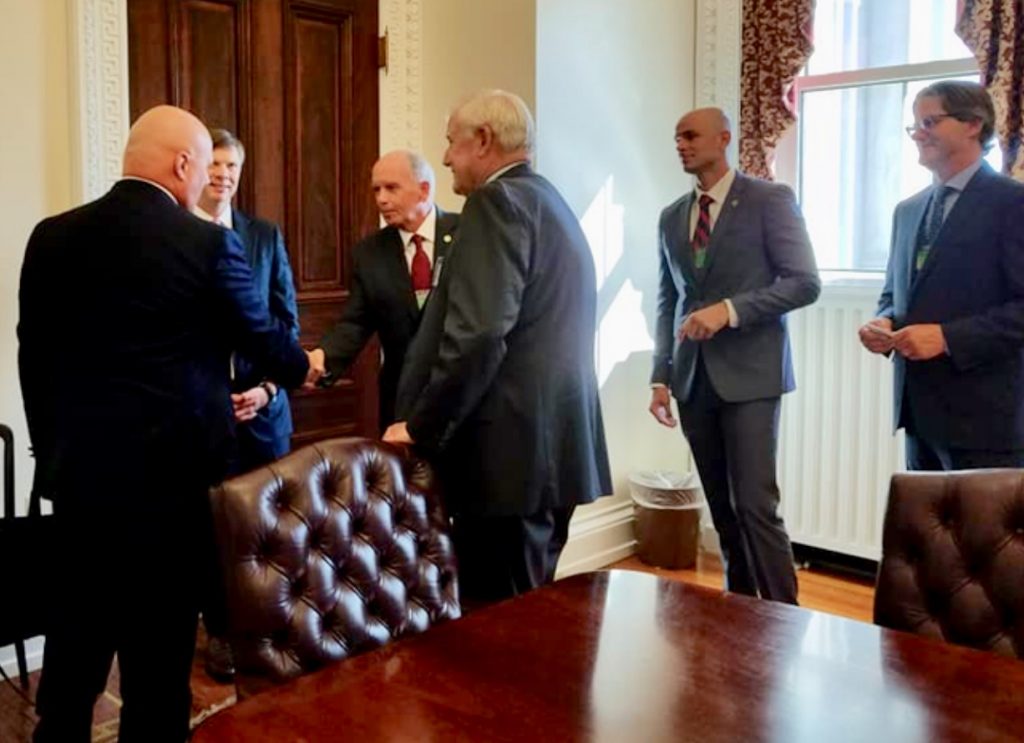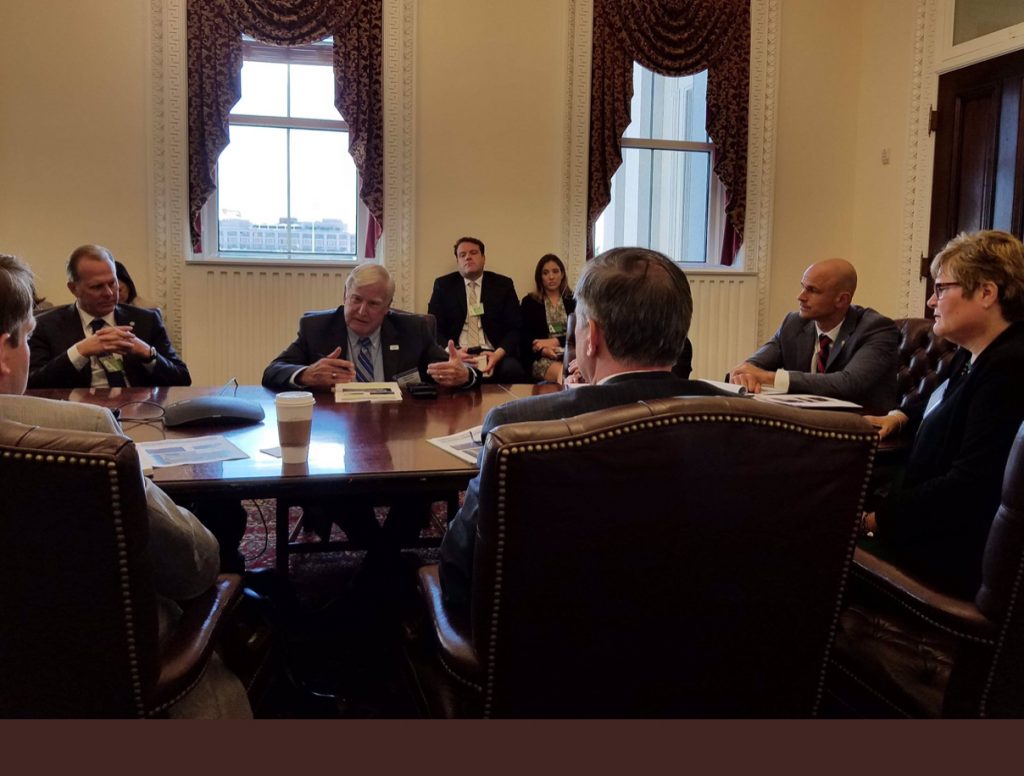On September 24, 2019, a delegation of San Diego mayors and the San Diego Port chairman attended an important meeting in Washington D.C. to discuss the Tijuana River Valley (TRV) toxic sewage pollution crisis. Port of San Diego Chair Admiral Garry Bonelli joined County Supervisor Greg Cox, Coronado Mayor Richard Bailey, San Diego Mayor Kevin Faulconer and Imperial Beach Mayor Serge Dedina in meetings with federal officials from the Office of Management and Budget (OMB), the White House Office of Intergovernmental Affairs, EPA’s Office of International and Tribal Affairs, the office of Natural Resources, Energy and Science, as well as Chairwoman of the Council of Environmental Quality.

During several previous trips to Washington, D.C., Mayor Richard Bailey had met with Chad McIntosh, Assistant Administrator of the EPA to discuss the TRV toxic pollution crisis. Mayor Bailey also had previous meetings with William Crozier, Deputy Director, White House Office of Intergovernmental Affairs. These previous interactions helped set the ground work for Tuesday’s crucial meeting.
An opportunity for Mayor Bailey to speak with POTUS personal attorney, former NYC Mayor Rudy Giuliani, further served to inform White House officials of the TRV pollution crisis in San Diego. Thousands of petitions for funds are made each week from all areas of the United States. Repeated outreach, personal contact and developing relationships with officials at all levels of government are essential to keeping one’s message at the forefront. Mayor Bailey’s earliest meetings in 2018, subsequent D.C. meetings attended with Councilman Whitney Benzian and City Manager Blair King through 2019, have served to increase awareness of the seriousness of the TRV pollution to our legislature, governmental agencies and the Trump administration.
Since early 2018, Mayor Bailey had reached out to pivotal individuals and government agencies as well as legislative representatives in California and Washington, DC to call attention to the TRV toxic pollution crisis.
The September 24 meeting took place in the Old Executive Office Building section of the White House. Present from the federal government were William Crozier, Deputy Director, White House Office of Intergovernmental Affairs, Chad McIntosh, Ass’t Administrator, EPA’s Office of International & Tribal Affairs, Brian McCormack, Associate Director for National Resources ,Energy & Science with the Office of Management and Budget (OMB), Mary Neumayer, Chairwoman, Council on Environmental Quality. In addition to the San Diego leaders mentioned previously, Sandra Kerl, Acting General Manager of the San Diego Water Authority was also in attendance.

Port of San Diego Chairman, Admiral Garry Bonelli’s input to this D.C. meeting was invaluable. Bonelli’s life long dedication to the Navy and the SEAL teams is well known. Most recently, Admiral Bonelli has supported Coronado’s request to pare down the Port of San Diego’s plans for development of the San Diego Bayfront at Coronado Ferry Landing and Grand Caribe Isle in the Coronado Cays.
Reporting on his take-away from the Tuesday meeting, Admiral Bonelli stated, ”As our neighbors in Coronado and Imperial Beach well know, raw sewage flowing from the Tijuana River Valley continues to be a long-lingering public health problem that has become much more acute during the past several years.
“Joining Supervisor Cox, Mayors Bailey and Dedina, we wanted to put a full court press on Trump Administration officials to show them we have a treatment solution that needs federal dollars. We made the point that the toxic sewage is not only a health problem that fouls our beaches; it also has national security implications. The pollution harms our Customs and Border Protection personnel as well as our sailors training to become U.S. Navy SEALS.”
The Coronado Times caught up with Mayor Richard Bailey at the latest of seven Town Hall meetings he had scheduled for September. Mayor Bailey had returned to Coronado late Tuesday night, having left immediately after completion of the White House meeting.
Mayor Bailey stated, “This is the first time all the regional stakeholders have been on the same page and behind the same set of solutions. We presented these solutions to the White House officials and the White House was very appreciative of all the work that has gone into this. They are aware that whichever solution they choose to pursue, they have committed local support.”
“One of the most important immediate actions the White House could do is to increase funding for BWIP (Border Water Infrastructure Program). The BWIP is an infrastructure sub-account within the EPA (Environmental Protection Agency) that had previously been zeroed out by both the Obama and Trump administrations. If we can increase that funding to $150 million, we believe we could successfully address this within the next three to five years.” Senator Dianne Feinstein (D-CA) and Senator John Cornyn (R-TX) had previously sponsored legislation funding $225 million to the North American Development Bank (NADB) to help support border environmental infrastructure. The Mayor continued, “The White House could work with our legislative body to champion bills that provide for increased funding as well. A funding solution could come from Congress or the Trump Administration or both. Now that we have identified the projects, the plans and the funding needed, all the stars are aligned for someone to take ownership of the TRV pollution issue and run with it. That is our next focus.”
Mayor Bailey said he believes, “this White House realizes the national security implications involved in solving this trans-boundary toxic pollution issue.” The mayor emphasized that Coronado, “being home to the Navy SEALS who train in those trans-boundary waters, as well as our U.S Border Patrol Agents, has special responsibility to call attention to protecting their welfare. The Border Patrol and Customs Agency has released a study which disclosed that over a six month period there had been 87 incidents in which agents suffered from contamination from raw sewage, pesticides, and heavy metal chemicals that regularly flow across the border. These are intolerable conditions in which they are forced to work. The national security issues really caught the White House’s attention. The White House is committed to solving tangible environmental catastrophes, and this is one that can be solved at a reasonable price tag.”
TRV Stakeholder Meetings to Continue
Two previous EPA TRV Stakeholder meetings have taken place in Imperial Beach and in Coronado. Invitations have been extended to White House officials met with in Washington D.C. to come to the next meeting, scheduled for October in San Diego. A visit to the Tijuana River Valley, neighboring Imperial Beach and Coronado to see first hand the proximity to the U.S. Navy SEAL training areas, should drive home that this is a national security and environmental crisis requiring immediate attention.
Supervisor Greg Cox also stressed the seriousness of training interruptions to recruits participating in rigorous BUD/S program in a meeting at Congresswoman Nancy Pelosi’s (D-CA) office.
Editor’s Note: Imperial Beach Mayor Serge Dedina was asked for comment for this article, but a response was not received before deadline. In addition, the title of “Congresswoman” was added to “Nancy Pelosi” in the last paragraph.




